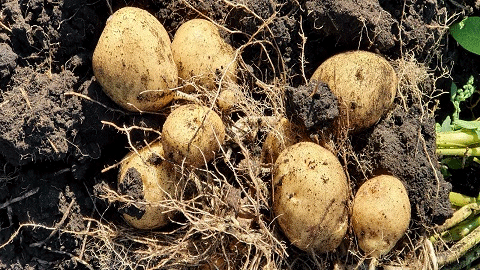In an exciting development for the potato industry, researchers from Siberian Federal University (SFU) have introduced a new pre-planting treatment that could revolutionize the way potatoes are protected from fungal diseases. This innovative method involves dipping or spraying potato tubers with a 1% solution of a biodegradable bio-polymer mixed with azoxystrobin, a highly effective fungicide. Early trials have shown promising results, with higher germination rates, better crop yields, and superior product quality.
The Challenge of Fungal Diseases in Potatoes
Potatoes are particularly vulnerable to several harmful fungal diseases, including Rhizoctonia (caused by Rhizoctonia solani), Alternaria (caused by Alternaria solani), late blight (caused by Phytophthora infestans), and Fusarium wilt (caused by Fusarium species). These pathogens are most damaging during the sprouting phase of the potato, where they can cause delayed germination, stunted growth, and even plant death, leading to significant crop losses.
Traditional methods of combating these diseases often involve multiple chemical treatments throughout the growing season, leading to higher costs and increased environmental impact. The new method proposed by SFU scientists, however, minimizes pesticide use while providing effective long-term protection.
How the Bio-Polymer Method Works
The treatment developed by SFU’s biotechnology team creates a thin, hydrophobic protective film around the seed potato. This polymer-based layer allows for air circulation while preventing the “microgreenhouse” effect, which can be detrimental to the tuber. The key advantage of this method is that the polymer gradually releases the fungicide into the soil as it degrades under the action of soil bacteria, providing continuous protection during the sprouting and early growing stages.
According to Professor Svetlana Prudnikova, the lead researcher of the project, the bio-polymer solution releases azoxystrobin in a controlled manner, ensuring that the potato’s root system remains protected throughout the crucial early stages of development. This reduces the need for repeated fungicide applications during the growing season.
Environmental and Economic Benefits
This novel approach offers several advantages over conventional fungicide treatments. The most significant benefit is the reduced quantity of chemicals required, as only one application of the bio-polymer is needed before planting. The controlled release of the fungicide ensures constant protection without the need for additional treatments during the growing period.
Moreover, the biodegradable polymer itself poses no threat to the environment. It breaks down into water and carbon dioxide through the action of native soil bacteria, a process that has been tested over more than a decade without any harmful effects. This makes the method both environmentally friendly and sustainable.
From an economic standpoint, the method has shown an increase in potato yield by approximately 5.6 tons per hectare. With the potential for mass production of the bio-polymer, this method could be scaled to benefit large agricultural enterprises and small farmers alike.
Expanding Applications for Agriculture
The versatility of this new method is another key strength. In addition to protecting against fungal pathogens, the bio-polymer could be adapted to carry insecticides, offering a novel approach to pest management. Researchers are already investigating the potential use of this technology for controlling pests that affect potatoes and other crops, providing a more integrated and sustainable pest management solution.
The innovative pre-planting treatment for potatoes developed by SFU researchers is a significant advancement in agricultural biotechnology. It not only offers a more sustainable and cost-effective solution to the persistent problem of fungal diseases but also demonstrates the potential for broader applications in pest and disease management. This method promises to enhance potato yields, reduce chemical usage, and contribute to more sustainable farming practices. As research continues, the future of crop protection could be revolutionized by this environmentally friendly, high-efficiency bio-polymer technology.







